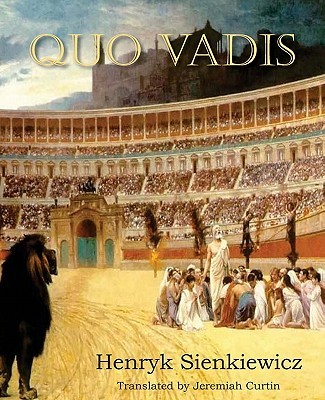
- We will send in 10–14 business days.
- Author: Henryk Sienkiewicz
- Publisher: Bottom of the Hill Publishing
- Year: 2011
- Pages: 342
- ISBN-10: 1612031102
- ISBN-13: 9781612031101
- Format: 19.1 x 23.5 x 1.8 cm, minkšti viršeliai
- Language: English
- SAVE -10% with code: EXTRA
Reviews
Description
Quo Vadis is a historical novel by Henryk Sienkiewicz, published in Polish under its Latin title in 1896. The title means "where are you going?" and alludes to a New Testament verse (John 13:36). The novel is set in ancient Rome during the reign of the emperor Nero and tells the story of the love that develops between a young Christian woman and a Roman officer who, after meeting her fellow Christians, converts to her religion. Underlying their relationship is the contrast between the worldly opulence of the Roman aristocracy and the poverty, simplicity, and spiritual power of the Christians. Henryk Sienkiewicz won the 1905 Nobel Prize in Literature. A Polish writer and patriot, he is best known abroad for his monumental historical epic Quo Vadis that portrays the vibrant and dissonant combination of cruel excesses and decadence of Rome during the reign of the corrupt Emperor Nero and the high faith of the emerging era of early Christianity.
EXTRA 10 % discount with code: EXTRA
The promotion ends in 23d.03:53:59
The discount code is valid when purchasing from 10 €. Discounts do not stack.
- Author: Henryk Sienkiewicz
- Publisher: Bottom of the Hill Publishing
- Year: 2011
- Pages: 342
- ISBN-10: 1612031102
- ISBN-13: 9781612031101
- Format: 19.1 x 23.5 x 1.8 cm, minkšti viršeliai
- Language: English English
Quo Vadis is a historical novel by Henryk Sienkiewicz, published in Polish under its Latin title in 1896. The title means "where are you going?" and alludes to a New Testament verse (John 13:36). The novel is set in ancient Rome during the reign of the emperor Nero and tells the story of the love that develops between a young Christian woman and a Roman officer who, after meeting her fellow Christians, converts to her religion. Underlying their relationship is the contrast between the worldly opulence of the Roman aristocracy and the poverty, simplicity, and spiritual power of the Christians. Henryk Sienkiewicz won the 1905 Nobel Prize in Literature. A Polish writer and patriot, he is best known abroad for his monumental historical epic Quo Vadis that portrays the vibrant and dissonant combination of cruel excesses and decadence of Rome during the reign of the corrupt Emperor Nero and the high faith of the emerging era of early Christianity.


Reviews